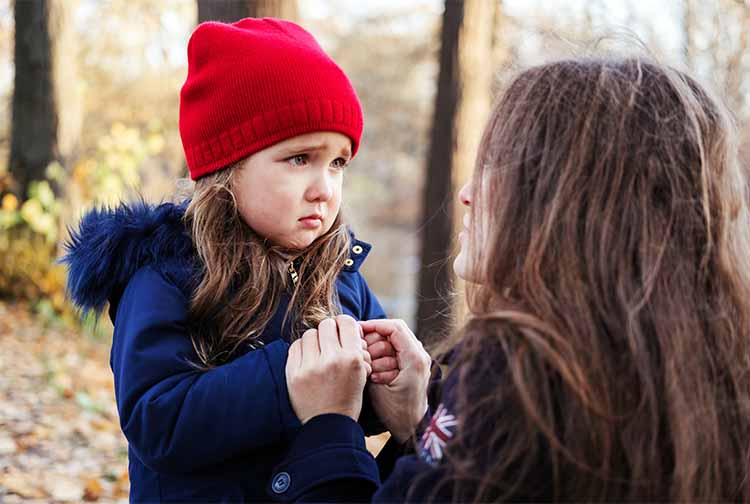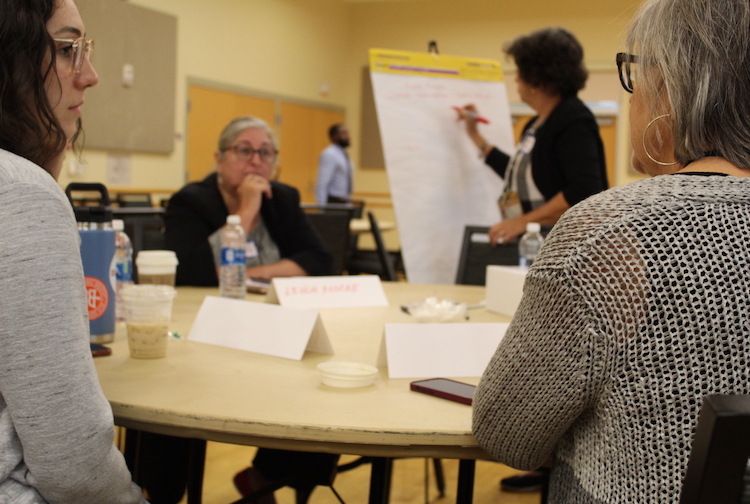
COVID, grief and the holidays: How to tell children that a loved one has died
November 17, 2021 Photo: Getty Images
Photo: Getty Images
This year you may choose to celebrate the holidays in person with extended family. But there may be someone missing. Someone your child may be expecting. How do you tell a child their loved has died from COVID-19? Here are some age-based suggestions from Children’s Hospital of Richmond at VCU.
Ages 0-2
Infants and toddlers don’t understand the concept or permanence of death. However, they do know when a sad event like a severe illness (“very, very sick”), injury or death has happened in their family and can feel the stress of separation.
How to tell your child
- Use simple, concrete words to explain what happened (“Grammy has died. That means she is not coming back. We will not be able to see her anymore.”)
- Avoid vague statements such as “Grammy went bye-bye” to avoid confusion between a temporary absence and a permanent one.
- Be patient when your child asks for their loved one and be prepared for multiple conversations in which you reinforce the permanence of death.
How to provide support
- Allow and encourage the use of comfort items (pacifier, stuffed animal, blanket, etc.)
- Recognize they may need more physical comforting and reassurance
- Do not punish them for any regressive behavior
- Acknowledge their feelings and give words to how they may be feeling ("I know you must feel scared and sad, but I am here to keep you safe and I love you.")
Ages 3-5
Children ages 3-5 rarely understand that death is permanent and that everybody dies at some point. They also may not understand that dead things do not breathe, eat or sleep. They often ask “How?” and “Why?”, and they may ask the same questions over and over again.
How to tell them
- Use clear language (don’t be afraid to use terms “death” or “dying”)
- Avoid terms like “passed away,” “gone home” or “went to sleep” to avoid confusion between a temporary absence and a permanent one
How to provide support
- Invite questions and answer them honestly and simply by using concrete, age-appropriate terms
- Be patient with confusion or repetitive questions/requests
- Provide as much physical comfort as they need
- Do not punish them for any regressive behavior
- Allow and encourage the use of comfort items (stuffed animal, blanket, etc.)
- Be open and honest about your own feelings and emotions – this can help children learn how to express their emotions and can give them the words to describe how they're feeling
Ages 6-12
Children in the 6-12 age range may understand that all people die and that death is irreversible, but they may still ask questions about the physical process of death/dying. Children this age may learn to identify death as involving a skeleton, ghost or angel and may have known someone or something who has died (a friend’s grandma or a family pet, for example).
How to tell them
- Use clear language (don’t be afraid to use terms “death” or “dying”)
- Avoid terms like “passed away,” “gone home” or “went to sleep” to avoid confusion between a temporary absence and a permanent one
- Avoid cliches (“Don’t worry, things will be OK.”)
- Discuss the types of feelings that people tend to have after someone they love dies; allow the child to express their emotions and be honest about your own
How to provide support
- Talk openly and honestly with your child, allowing them to ask questions
- Be honest and tell a child if you don’t have an answer
- Help them remember positive memories of their loved one
Activities to help your child cope
Children often look to adults to model healthy behaviors, including during times of grief. Being open about your own feelings can help children learn how to express themselves. Encourage them to join you in some of the following coping activities:
- Continue to celebrate the holiday with your familiar traditions
- Share stories and talk about what you loved most about your loved one
- Journal, color or draw pictures
- Create a memory box
- Help them resume participation in enjoyable activities
If your child’s grief seems uncontrollable
It’s important not to judge grief responses unless they cause harm to oneself or others, or they persistently interfere with daily living (eating, sleeping, bathing, schoolwork). There is no single “right” or “appropriate” way to grieve.
As time passes, signs of grief should recede. Watch out for these signs, though, as they could signal that your child needs additional help:
- Persistent withdrawal or isolation
- Extreme, prolonged sadness or depression
- Undue fear that another loved one will die
- A desire to join the dead person
- Continual decline in functioning
If these signs of grief continue to worsen and things are not getting better within a few months, your child may be experiencing “complicated” grief, which will require professional help. If your child is inconsolable or expresses these or any other behaviors you find difficult to manage, contact your child’s doctor or medical team.
Read additional, age-specific expectations and recommendations for coping and support.
If you, yourself, need help coping with your grief at this time, here are some suggestions for adults on how to handle grief during the holidays.
See All News See COVID News


